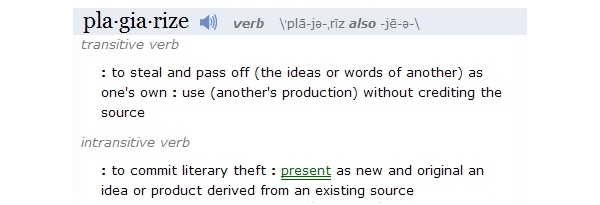Honestly, I debated whether or not to write this article and post it publicly. I’ve been putting it off for a couple of weeks now because I don’t want it to come across as some petty grudge between competitors. Unfortunately, my efforts to resolve this matter quietly behind the scenes were met with stony silence, and I just don’t feel that I can let this stand any longer. What am I talking about? A former employer of mine has been recycling old DVD reviews, making minimal changes, and presenting them as brand-new Blu-ray reviews without any attribution to the source. Follow after the break for all the gory details.
I worked for DVDFile.com from 2000 to 2004. I left the site shortly after its acquisition by new corporate owners (InterActual Technologies) who had no idea how to run it or what to do with it. InterActual was later swallowed up in turn by Sonic Solutions, and DVDFile has changed hands a couple of times since then. The site is currently owned by Crave Online. (The new owners gave the site a hideous makeover involving tiny white text on dark blue backgrounds that’s extremely painful on the eyes to read, but that’s neither here nor there.)
I must have written a couple hundred DVD reviews when I was with DVDFile. Among them was a review of the Criterion Collection DVD release of David Cronenberg’s ‘Videodrome‘. In the last few years, DVDFile (under its current editorship) has done a couple of things that I strongly disagree with. The first is that the site has a bad habit of recycling the text of old DVD reviews whenever a movie is re-released, either on DVD or on Blu-ray. Typically, the “Movie” portion of the old review will just be copied wholesale, with updates made only to the technical or supplement sections. However, in many cases, the recycling is so bad that even the technical sections will remain mostly the same, except for a few words swapped out here or there.
What makes this “Frankensteining” of old reviews even worse is that DVDFile no longer credits the writers of any article. All reviews on the site (both new and old) now have a generic “by DVDFile” byline which masks the original authorship. I suppose this makes it easy for the current editor and stable of writers to pawn off old reviews as their own brand-new work.
That’s essentially what happened to ‘Videodrome’ after Criterion recently released the movie on Blu-ray. I happened to have been writing a fresh Blu-ray review for Home Theater magazine, and needed to reference back to my old article to verify that Criterion carried over all of the same bonus features. I rarely bother to visit DVDFile anymore, but popped in for this reason. When I did that, I noticed a link to a ‘Videodrome’ Blu-ray review on the site’s front page. Knowing the site’s fondness for recycling, I had an immediate bad feeling that my old review may have been regurgitated without credit. Sure enough, that’s just what happened.
Here is a link to the new Blu-ray review “by DVDFile.” Here’s a link to the original DVD review, first published September 16, 2004. As I explained, the old article has been stripped of its original byline. Using the Internet Archive Wayback Machine, here’s another link to an archive copy of the original page as it appeared in 2004. You can clearly see my byline on it. (Not that this makes any difference, but the old page lists an erroneous publish date of August 2, 2004. As I recall, there was a bug in the system that added incorrect dates to all reviews for a period of a few months. Regardless, both dates are clearly well in the past.)
As you can see, the main “Movie” section is a straight copy/paste of my original work. The “Supplements” section is also about 98% my writing, with just a few changes to delete or modify references specific to the DVD edition, and to add a quick notation that the Blu-ray has no BD-Live features. The “Final Thoughts” section (the shortest portion of the article) is about half mine and half new.
I’m already offended enough by all of that. What I find unforgivable is that the Video and Audio technical sections are largely similar as well. Here’s my original text, written in 2004:
Video: How Does The Disc Look?
Videodrome was previously released on DVD by Universal Home Video back in 1998 with a barely-acceptable non-anamorphic widescreen transfer. Criterion’s new remaster is of course a significant improvement. In fact, it looks pretty terrific for a low-budget Canadian horror flick from 1983.
The movie retains its 1.85:1 aspect ratio from the past DVD, which occasionally looks a little tight on the top and bottom, but adds anamorphic enhancement for a much more detailed image. The picture has been mastered from fine-grained source elements in excellent condition and digitally scrubbed of imperfections. Colors are clean and striking in their subtle shadings. Contrast range and depth are excellent, as is visible shadow detail. The picture is fairly sharp and has basically no edge enhancement artifacts (I noticed some fleeting ringing on exactly one random shot). There is a minor presence of grain owing to the film stocks used, but it looks very natural and film-like without noise or distortion. Criterion once again gets high marks all around for their efforts.
Audio: How Does The Disc Sound?
The Dolby Digital 1.0 mono soundtrack is also in good shape, though obviously is restrained by the limitations of its original sound design. Howard Shore’s gothic electronic score has nice depth and clarity for a monaural recording. Resonant bass is present in the music, but the rest of the soundtrack has little snap or boom. Gunshots sound hollow, probably library tracks from a sound effects tape. On the other hand, all of the squirming and pulsing of writing flesh machines sounds suitably icky.
And here are the same portions from the new Blu-ray review. I will highlight in red all text that’s been copied.
Video: How Does The Disc Look?
Videodrome continues to look pretty terrific for a low-budget Canadian horror flick from 1983: In fact, this Blu-ray Disc 1.85:1 1080p transfer presents the film just about as perfectly as Cronenberg fans could hope for. The picture has been mastered from fine-grained source elements in excellent condition and digitally scrubbed of imperfections. Colors are clean and striking in their subtle shadings. Contrast range and depth are excellent, as is visible shadow detail. The picture is fairly sharp and has no edge enhancement artifacts or compression artifacts. Grain presence is the big upgrade between Criterion’s DVD and BD editions, though – here on Blu-ray, the movie has a lovely, film-like presence that it didn’t have on standard-def DVD.
Audio: How Does The Disc Sound?
Sure, Videodrome is tethered by the limitations of its original sound design, but this LPCM mono sound mix preserves the film to a T. Howard Shore’s gothic electronic score has nice depth and clarity for a monaural recording. Resonant bass is present in the film’s music, and all of the squirming and pulsing of writing flesh machines sounds suitably icky. You’re not going to find a better sound mix for Videodrome than the lossless track here.
The parts that are new are token changes at best, and sound generic enough to apply to almost any movie that’s been upgraded from DVD to Blu-ray. Frankly, I wouldn’t be surprised if the reviewer hadn’t bothered to watch either disc at all, and just extrapolated the differences based on what he expected of a Criterion Blu-ray release.
After I discovered this, I emailed the editor and asked that he either change the review, or at least provide credit to the original source. That was a couple weeks ago, and he has neither responded nor taken any action.
Is this plagiarism? I certainly feel that it is. Legally, this may fall into a gray area, unfortunately. The text published on DVDFile remains the copyright of DVDFile, so I believe the site can do whatever it wants with the old reviews. (If we have any lawyers reading this, please chime in.) In any case, the ethics of this behavior are questionable at best. These “Frankensteined” reviews are disingenuous and misleading to readers.
[Before anyone tries to point out the possible irony, I must note that the banner image on this post comes from Merriam-Webster. The thumbnail image used on the mobile version of our site and on Facebook comes from this page.]






besch64
I assume they made you sign a work for hire form when you first started working for them. If they didn’t they’re the most incompetent company in the history of history. So assuming that you did sign one, that means all your writing is theirs for them to do what they will with and that’s that.
motorheadache
Well, even if you can’t do anything about it, it’s good to know that I should be avoiding the site, as they obviously don’t put any effort into their reviews at all.
Jane Morgan
This is Hollywood. Once the writer sells the script, he no longer owns it.
Do you own HDD? Or is this going to happen again in ten years?
Dick Ward
This is Hollywood? I’m super confused by the snow outside 🙁
EM
Fake, obviously.
Dick Ward
Aw damn! I knew it seemed a little off. I guess that explains the green screen too.
Josh Zyber
AuthorEven when a movie studio buys a script, it has an obligation to credit the writer if the movie gets made. You don’t see movies being released with the screenplay “by Paramount.”
But really, my concern here isn’t just about credit. To my mind, what’s even more troubling is the fact that the site has dredged up 6-year-old text written about a standard-definition DVD and is presenting it as a brand new review written about the Blu-ray.
EM
Theoretically, the site could overcome the problem of accuracy and perception of accuracy by acknowledging the older review even while keeping its author anonymous. For example, it could say, “Audio presentation is identical to the 2004 release. Here is what DVDFile said about that disc’s audio in its review from September 16, 2004:”.
Even so, reviewer anonymity does a disservice not just to the reviewer but also to the reader. (By anonymity, I mean total lack of individual attribution; I’m not referring to an individual’s consistently used pen name.) Attributions help readers decide the worth of the review. For example, a reader might decide reviewer X is highly knowledgeable about picture quality but has lousy taste in comedies, leading the reader to consider X‘s advice accordingly.
Jane Morgan
The rules for who gets screenplay credit are pretty fucked up. And that’s with the help of a union.
The internet is still the wild wild west. Blu-ray review pirates are just the newest insanity.
HDD is the only site I read for blu-ray reviews. As long as you guys stay shiny, I’m not too concerned about the rest of the junk on the web.
EM
I had perceived a precipitous drop in quality at DVDFile, but these twin practices of sloppiness and sliminess make me out-and-out glad that I no longer visit the site.
Ben Jennings
Does anyone actually read DVDfile at all anymore?
WOW I just went to the homepage and it could not be more hideous.
EM
I don’t know if anyone actually reads DVDFile anymore, but it certainly is a challenge now, isn’t it? 😉
Shannon Nutt
Here’s the thing Josh (as a former employee of another DVD company I have some experience here, although they have and continue to give me credit for the work I did…mainly beacuse I still have good friends there!)- they probably have a disclaimer that anything submitted to their site for posting (whether paid for or not) becomes their intellectual property immediately…that pretty much covers their behinds from a legal standpoint. You still MIGHT have an argument in court, but I doubt it. Heck, even when you make a customer/vistor comment to AMAZON or CNN or any site like that, they’ve essentially become the owners of your text. Now any decent site will credit the author if they re-use the work, but that doesn’t mean they’re legally obliged to.